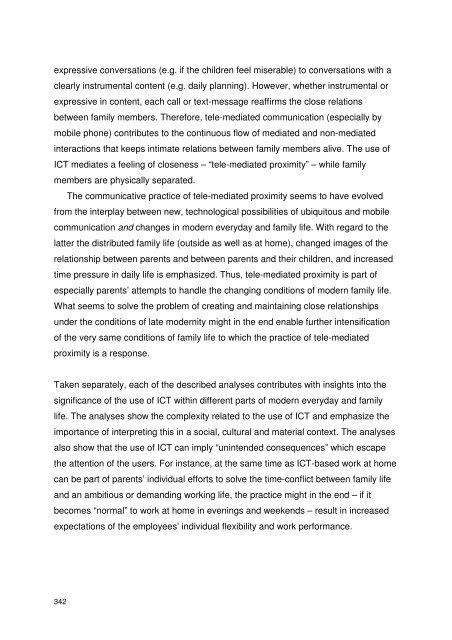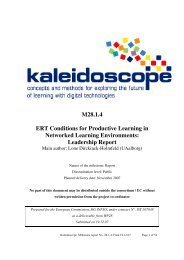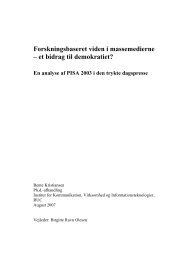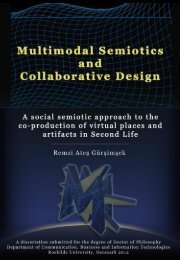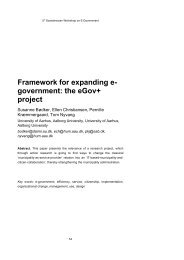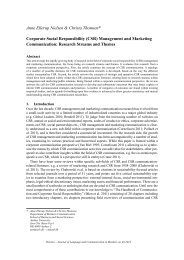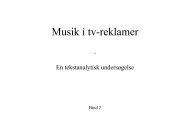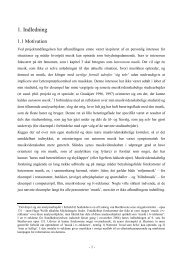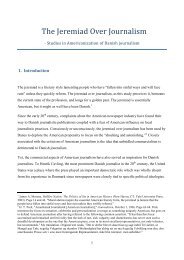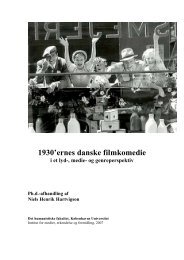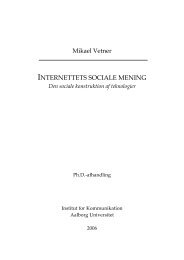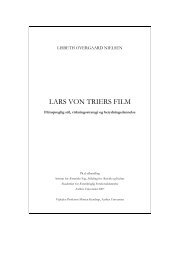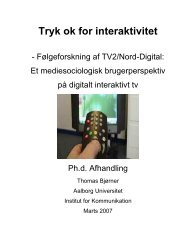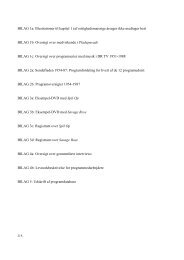- Page 1 and 2:
PH.D. AFHANDLING Informations- og k
- Page 3 and 4:
Indhold Forord 5 Kapitel 1: Indledn
- Page 5 and 6:
Forord Denne afhandling er resultat
- Page 7 and 8:
Kapitel 1: Indledning Vor Tid staar
- Page 9 and 10:
Arbejdet, som ligger til grund for
- Page 11 and 12:
Andel af danske familier (%) 100 Fi
- Page 13 and 14:
søgelser indikerer, at omkring 9%
- Page 15 and 16:
til udtryk ved at sociologiske anal
- Page 17 and 18:
Hovedproblemstilling 1 Hvordan indg
- Page 19 and 20:
Mht. hvilke konkrete IKT-teknologie
- Page 21 and 22:
anlægger, og med hvilken styrke ef
- Page 23 and 24:
teknologiers (artefakters) konkrete
- Page 25 and 26:
procedurer/fremgangsmåder (eng. pr
- Page 27 and 28:
Ingen af hverdagslivets praksisser
- Page 29 and 30:
Jørgensen definerer slet og ret de
- Page 31 and 32:
etingelser - i dette tilfælde hver
- Page 33:
familie og arbejde og en praksis, d
- Page 36 and 37:
som empirisk metode. Samtidig ønsk
- Page 38 and 39:
generelle med henblik på at kunne
- Page 40 and 41:
Ifølge den kritiske realisme kan e
- Page 42 and 43:
teoretisk informeret analytisk vide
- Page 44 and 45:
det sikkert ville have været vansk
- Page 46 and 47:
konsistens på tværs af interviewe
- Page 48 and 49:
48 Interviewets formål er at bidra
- Page 50 and 51:
50 Det skulle imidlertid vise sig v
- Page 52 and 53:
indkredse IKT’s mulige betydning
- Page 54 and 55:
Med dette nye design gennemførte j
- Page 56 and 57:
kontorlignende arbejde, men altså
- Page 58 and 59:
&' ( ! ) " * " 1 # 5 . - $ 58 * " $
- Page 60 and 61:
strømmen - typisk af få sekunders
- Page 62 and 63:
elationer og tid til samvær. I int
- Page 64 and 65:
Det var dog ikke alle analyseideer,
- Page 66 and 67:
For at læseren selv kan danne sig
- Page 68 and 69:
stabilt på 33-34% gennem perioden
- Page 70 and 71:
70 Embedsmænd, sagførere og læge
- Page 72 and 73:
andelen af udearbejdende kvinder. I
- Page 74 and 75:
”stedforældre”. En afgørende
- Page 76 and 77:
egisterdata (herunder CPR-registret
- Page 78 and 79:
tiendedel af børnene bor sammen me
- Page 80 and 81:
80 mellanmänskliga relationerna at
- Page 82 and 83:
At forældre i dag føler et størr
- Page 84 and 85:
tidsforbrug fordelt på en række f
- Page 86 and 87:
Figur 3: Mænds og kvinders gennems
- Page 88 and 89:
88 *+,4 0..* ! 51 ! 51 6 A: A A A A
- Page 90 and 91:
Af den samlede tid brugt på omsorg
- Page 92 and 93:
(familien) synes at indtage en stæ
- Page 94 and 95:
tid. En kritik af ens egen eller sa
- Page 96 and 97:
”klassiske” kernefamilies monop
- Page 99 and 100:
Kapitel 4: Præsentation af familie
- Page 101 and 102:
65 9 ; ; < , 5' ; A=- . - . ! 1 A !
- Page 103 and 104:
Arbejdsrelaterede spørgsmål og pr
- Page 105 and 106:
Jørgen er ofte af en mere praktisk
- Page 107 and 108:
Familien Bach Rie Bach (50 år) bor
- Page 109 and 110:
Lars tilbringer en stor del af tide
- Page 111 and 112:
familien typisk om at se film, spis
- Page 113 and 114:
med kollegaen eller tager bussen).
- Page 115 and 116:
at indsamle budget- og regnskabstal
- Page 117 and 118:
sælger industrimaskiner til kunder
- Page 119 and 120:
gode råd eller reparerer deres ele
- Page 121 and 122:
aftensmad sammen med børnene. Han
- Page 123 and 124:
’udpræget bymenneske’ og ’me
- Page 125 and 126:
Kapitel 5: Hverdagens tidskabale De
- Page 127 and 128:
må tage et stykke chokolade, om ha
- Page 129 and 130:
Gennem årene har familien haft fle
- Page 131 and 132:
I forhold til den daglige kommunika
- Page 133 and 134:
arbejdet. Dels er Carsten og Bente
- Page 135 and 136:
nævnes blandingsbatterier til køk
- Page 137 and 138:
søskende - fx hvis de har været t
- Page 139 and 140:
Gert udtrykker en tidsøkonomiseren
- Page 141 and 142:
tilbage mellem deres hjem. På en a
- Page 143 and 144:
som ville ønske, at Hans frivillig
- Page 145 and 146:
I tidligere ansættelser har vanske
- Page 147 and 148:
Familien Bondesen Til forskel fra i
- Page 149 and 150:
som handler ind, men når Nikolaj s
- Page 151 and 152:
sige til ham, om han ikke lige er s
- Page 153 and 154:
Således svarede Arne Nørgård på
- Page 155 and 156:
de hjemlige opgaver og ansvar kan i
- Page 157 and 158:
Therese: (...) ringer et af børnen
- Page 159 and 160:
Oplevelsen af at være fanget i en
- Page 161 and 162:
Hverdagens kabale som problem? Med
- Page 163 and 164:
forventninger, men også havde samm
- Page 165 and 166:
Albertes oplevelse af hverdagens ti
- Page 167 and 168:
synes multi-tasking - dvs. at udfø
- Page 169 and 170:
Kapitel 6: Distribuerede familieliv
- Page 171 and 172:
syntetisere deres individuelle erfa
- Page 173 and 174:
spiste hver for sig. Med henvisning
- Page 175 and 176:
Jeg har her forsøgt, uden større
- Page 177 and 178:
$ ! En anden form for dynamik, som
- Page 179 and 180:
• Spredning af arbejdsplads og bo
- Page 181 and 182:
tidspunktet for det ene af intervie
- Page 183 and 184:
Kapitel 7: Koordinering og planlæg
- Page 185 and 186:
Således tog Hans sig af tømrerarb
- Page 187 and 188:
og ansvar mellem forældrene. Man k
- Page 189 and 190:
Pga. forældrenes travle arbejdsliv
- Page 191 and 192:
madlavningen, uden dog at have egen
- Page 193 and 194:
Af tabellen fremgår det bl.a., at
- Page 195 and 196:
= 1 / 1 > = 1 / 1 > = Tabel 10 (for
- Page 197 and 198:
Det er tydeligt, at denne form for
- Page 199 and 200:
Derudover kan samtalerne lejligheds
- Page 201 and 202:
teknologier kan tænkes at underst
- Page 203 and 204:
af dagen, fx om hvornår børnene k
- Page 205 and 206:
inge og lave den om, ik’. Men der
- Page 207 and 208:
Bente: Hun har nogle gange ringet t
- Page 209 and 210:
Tabet af kontrol og følelsen af ut
- Page 211 and 212:
4% % Tæt forbundet med spørgsmål
- Page 213 and 214:
Orienteringerne ved forsinkelser in
- Page 215 and 216:
Anna finder det naturligt, at man o
- Page 217 and 218:
pga. kø på motorvejen. I begge ti
- Page 219 and 220:
arbejdsliv; de er begge ambitiøse
- Page 221 and 222:
ekoordinering - karakteren af foræ
- Page 223 and 224:
Kapitel 8: Moderne arbejdsliv og IK
- Page 225 and 226:
involvere ekstra arbejde i form af
- Page 227 and 228:
Det er dog ikke alle informanter, s
- Page 229 and 230:
kunne lide - det passer til mit tem
- Page 231 and 232:
Jeg vil i kapitel 9 præsentere en
- Page 233 and 234:
kompetenceudvikling, flad organisat
- Page 235 and 236:
possessions that are no longer desi
- Page 237 and 238:
og familie og menneskers oplevelse
- Page 239 and 240:
forhold knyttet isoleret til famili
- Page 241 and 242:
efolkningen vil blive presset af ar
- Page 243 and 244:
forandringer, opdateringer og udski
- Page 245 and 246:
venner i arbejdstiden, ligesom ansa
- Page 247 and 248:
Kapitel 9: Mellem arbejde og famili
- Page 249 and 250:
der eksklusivt hører til det ene e
- Page 251 and 252:
arbejde og hjem: ”everything belo
- Page 253 and 254:
Af hovedinformanterne er det kun Ri
- Page 255 and 256:
sammen med børnene. Dermed giver h
- Page 257 and 258:
Tabellen viser, at der er store var
- Page 259 and 260:
Figur 5 er naturligvis stærkt fore
- Page 261 and 262:
De hjemmearbejdende forældres plac
- Page 263 and 264:
planer om at indrette sit gamle arb
- Page 265 and 266:
om morgenen eller formiddagen, inde
- Page 267 and 268:
Carsten: (...) det kommer jo an på
- Page 269 and 270:
vist ikke helt, hvad du overvejer
- Page 271 and 272:
indskrænke deres tilgængelighed f
- Page 273 and 274:
Denne type samfund [videnssamfundet
- Page 275 and 276:
hans rolle som stedfader), men modt
- Page 277 and 278:
Dianas tilfælde hænger valget af
- Page 279 and 280:
for telefonopkald under møder, men
- Page 281 and 282:
Bente: Det stresser. Carsten: Hvis
- Page 283 and 284:
og eventuel samlever i arbejdstiden
- Page 285 and 286:
lægger en ny sag på dit bord (ell
- Page 287 and 288:
Kapitel 10: Telemedieret nærhed Fa
- Page 289 and 290:
, Valget af familierne Hansen og Po
- Page 291 and 292: for børnene via mobiltelefonen, hv
- Page 293 and 294: Samme grad af kønsmæssig asymmetr
- Page 295 and 296: illustreredes tidligere med intervi
- Page 297 and 298: Sammenfattende kan det konkluderes,
- Page 299 and 300: grundlaget for etableringen og udvi
- Page 301 and 302: Ved at placere den medierede intera
- Page 303 and 304: 10.2 Telemedieret nærhed og modern
- Page 305 and 306: their domestic career, towards more
- Page 307 and 308: eller hvad vi nu kan finde på (…
- Page 309 and 310: hvor bl.a. den rumlige placering af
- Page 311 and 312: Selvom der ingenlunde er tale om en
- Page 313 and 314: Kapitel 11: Sammenfatning Væksten
- Page 315 and 316: og den telemedierede kommunikation
- Page 317 and 318: Der identificeres to delvist forske
- Page 319 and 320: & Analysen afsluttes med en diskuss
- Page 321 and 322: af personlige IKT- og medieteknolog
- Page 323 and 324: Litteraturliste Adam, Barbara (1990
- Page 325 and 326: Danmarks Statistik (2002): Børns L
- Page 327 and 328: Harste, Gorm og Mortensen, Nils (19
- Page 329 and 330: Ling, Richard (2004): The Mobile Co
- Page 331 and 332: Sullivan, Cath og Lewis, Suzan (200
- Page 333 and 334: Resumé Denne afhandling bærer tit
- Page 335 and 336: overordnede tilgang til at planlæg
- Page 337 and 338: Som helhed viser afhandlingen, at I
- Page 339 and 340: English Summary The PhD thesis is e
- Page 341: and to which extent ICT is used for
- Page 345 and 346: Bilag 1: Dagbog over brug af IKT Da
- Page 347 and 348: Bilag 2: Første interviewguide Ove
- Page 349 and 350: Bilag 3: Anden interviewguide Overs
- Page 351 and 352: Bilag 4: Tredje interviewguide Over


